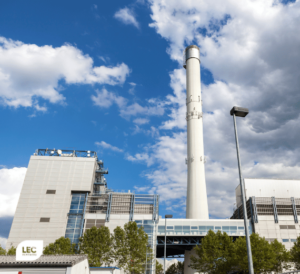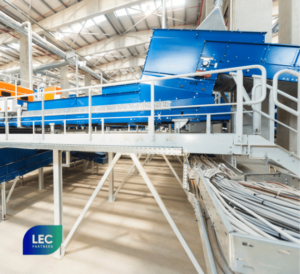Technological Innovations in Biofuel Production: A Deep Dive into Pyrolysis and Gasification

Modern Waste to Energy Plant
In the quest for greener energy sources, converting municipal solid waste (MSW) into biofuel is emerging as a key solution, leveraging technological innovations to address environmental and energy challenges. Technologies such as pyrolysis and gasification are transforming waste management practices, turning everyday waste into valuable energy resources. This article delves into these two advanced technologies, exploring their processes, benefits, and their role in modern waste-to-energy initiatives, along with the necessary experience to commercialize such projects.
Understanding Pyrolysis and Gasification
Pyrolysis is a thermochemical decomposition of organic material at elevated temperatures (between 400 – 900°C) in the absence of oxygen. This versatile process converts a variety of waste materials, including biomass and plastics, into three primary products: char, bio-oil, and syngas (synthesis gas). Each byproduct has significant utility: char can be used as a soil amendment, bio-oil as a fuel substitute, and syngas as a feedstock for generating electricity or producing other chemicals.
Gasification, while similar to pyrolysis, involves partial oxidation of the biomass or waste material. It operates at higher temperatures (above 1000°C) and introduces a controlled amount of oxygen or air. This not only supports higher energy conversion efficiencies but also produces a cleaner and more energy-rich syngas, composed predominantly of hydrogen and carbon monoxide. Gasification’s flexibility allows it to process diverse waste streams, including those with high moisture content, without the need for extensive pretreatment.
Pyrolysis in Biofuels Strategy
Interest in pyrolysis comes from its ability to process the organic fractions of MSW, which constitutes a significant portion of the waste stream. The potential to transform organic waste into valuable bio-oil and char aligns with global goals to reduce landfill use and create alternative energy sources. However, the process faces challenges, particularly with the high moisture content of food waste typical in MSW. Such waste requires substantial drying, which can pose economic and logistical hurdles, potentially offsetting the energy gains from the process.
The Potential of Gasification
Gasification shows promise due to its robustness in handling heterogeneous and moist waste streams. After appropriate sorting and drying, MSW can be effectively converted into syngas. This syngas could then be utilized to produce electricity, or further processed into liquid biofuels or chemicals, supporting a diversified energy portfolio.
Commercializing Pyrolysis and Gasification Projects
The journey from technology validation to commercial success in pyrolysis and gasification involves several critical stages and requires diverse expertise:
- Technical Expertise and Experience: Successful commercialization begins with robust technical knowledge, including engineering design, process optimization, and scalability from pilot to full-scale operations. Professionals with experience in chemical engineering, process control, and material sciences are crucial to navigating the complex technical landscape of these technologies.
- Regulatory Compliance and Environmental Impact: Understanding local and international regulations concerning waste management and emissions is vital. Experience in environmental science and legal expertise can help navigate these regulations, ensuring that projects not only comply with current laws but are also prepared for future policy changes.
- Financial Acumen: Developing a viable financial model is essential for attracting investment. Experience in financial planning, risk assessment, and securing funding through various channels, including government grants, private equity, and green bonds, is critical.
- Market Development and Commercial Strategy: Identifying and developing markets for byproducts such as biochar, syngas, and bio-oil is essential. Professionals with marketing and business development expertise in the energy and chemical sectors can drive commercial success by establishing supply chains and forging partnerships with end-users.
- Project Management and Operational Excellence: Implementing these projects requires coordinated project management to handle logistics, supply chain issues, and construction challenges. Skilled project managers with a track record in similar large-scale energy projects are indispensable.
- Sustainability and Community Engagement: Engaging stakeholders and the community early in the project can facilitate smoother operations and acceptance. Experience in public relations, community outreach, and sustainability reporting is advantageous to underline the project’s environmental and social benefits.
Conclusion
Adopting pyrolysis and gasification technologies represents a significant step towards sustainable waste management and biofuel production. By converting waste into valuable resources, these technologies help mitigate the environmental impact of traditional disposal methods and contribute to energy diversification efforts. As global interest in sustainable and renewable energy sources grows, the experiences and lessons learned will likely serve as a model for other regions pursuing similar transformations. The success of such projects hinges on a blend of technical proficiency, regulatory savvy, financial acumen, and strategic market development.
Partner with LEC for Pyrolysis and Gasification Success
At LEC Partners, we are dedicated to helping businesses of all sizes achieve sustainable and successful outcomes. Whether you’re a startup or a multinational company, our community of world-renowned bioeconomy experts has the experience and expertise to guide you to success.
Why Choose LEC Partners?
- Unmatched Bioeconomy Expertise: As trusted leaders in the bioeconomy, we deliver sustainable and profitable results, guiding projects from planning to execution.
- Customized Teams: Your project is unique, and so is our approach. We assemble a custom team to meet your specific needs, whether you require one expert or many.
- Streamlined Communication: No matter the size of your project team, you will always have a single point of contact for seamless coordination and communication.
- Comprehensive Services: Beyond engineering, operational, and financial guidance, we offer additional services like regulatory support and expert witness testimony, to ensure you are covered from every angle.
Ready to Transform Your Biofuels Business?
Take the next step and partner with us to shape the future of Biofuels. Contact us today to learn how our community of over 180 bioeconomy experts can help you achieve your goals.
Have some questions?
Not sure where to start?
Let's start a conversation. We're here to help you navigate
the bioeconomy with confidence.

